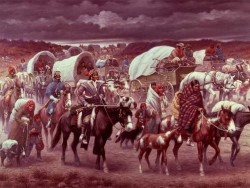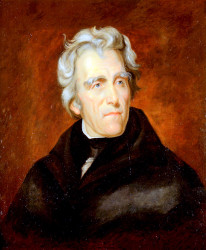
This picture, The Trail of Tears, was painted by Robert Lindneux in 1942. It commemorates the suffering of the Cherokee people under forced removal. If any depictions of the “Trail of Tears” were created at the time of the march, they have not survived.
Image Credit: The Granger Collection, New York (Source PBS Online)
Andrew Jackson “Second Annual Message to Congress” (December 16, 1830)
[Read more about Andrew Jackson in this post.]

Andrew Jackson (1825) by Thomas Sully (Source: US Senate)
The benevolent policy of the Government, steadily pursued for nearly 30 years, in relation to the removal of the Indians beyond the white settlements is approaching to a happy consummation….
Toward the aborigines of the country no one can indulge a more friendly feeling than myself, or would go further in attempting to reclaim them from their wandering habits and make them a happy, prosperous people. I have endeavored to impress upon them my own solemn convictions of the duties and powers of the General Government in relation to the State authorities. For the justice of the laws passed by the States within the scope of their reserved powers they are not responsible to this Government. As individuals we may entertain and express our opinions of their acts, but as a Government we have as little right to control them as we have to prescribe laws for other nations….
The present policy of the Government is but a continuation of the same progressive change by a milder process. The tribes which occupied the countries now constituting the Eastern States were annihilated or have melted away to make room for the whites. The waves of population and civilization are rolling to the westward, and we now propose to acquire the countries occupied by the red men of the South and West by a fair exchange, and, at the expense of the United States, to send them to a land where their existence may be prolonged and perhaps made perpetual.
Doubtless it will be painful to leave the graves of their fathers; but what do they more than our ancestors did or than our children are now doing? ….
Complete Text and Source: Andrew Jackson: “Second Annual Message,” December 6, 1830. Online by Gerhard Peters and John T. Woolley, The American Presidency Project.
The Indian Removal Act was signed into law by Andrew Jackson on May 28, 1830. It gave the president authority to grant unsettled lands west of the Mississippi in exchange for Indian lands within existing state borders.
“A few tribes went peacefully, but many resisted the relocation policy. During the fall and winter of 1838 and 1839, the Cherokees were forcibly moved west by the United States government. Approximately 4,000 Cherokees died on this forced march, which became known as the ‘Trail of Tears.'”
Source: Library of Congress, Indian Removal Act “Primary Documents in American History”